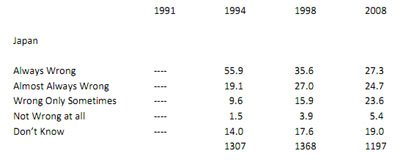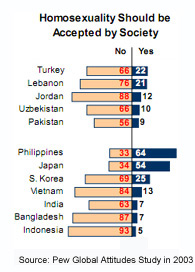Politicians resist friendly moves on sexual orientation and gender identity issues saying their societies are “conservative.” This often means “religious.” That often means there is an active Christian or Muslim lobby waiting to pounce.

When initiatives on anti-discrimination laws emerged in Hong Kong and in Korea, they were killed by conservative Christian activists, who responded almost immediately with money and organisation. Full page advertisements appeared in local-language Hong Kong papers. Thailand, in contrast, has perhaps the lowest percentage of Christians of any country in Asia. In India Christians are largely a progressive minority who would not be leading campaigns against homosexuals and transgenders.
The Williams Institute at the law school at the University of California Los Angeles (UCLA) has just published an overview of a set of polls of public opinion in 42 countries. The surveys were conducted by the International Social Survey Program (ISSP).
Only four countries in Asia were included. Not very good you may say – but for Africa there is only one and for Latin America only two. The bias is overwhelmingly in favor of Australasia, North America, Western Europe and Eastern Europe. Turkey and Israel are included, but I have not grouped them with Asia.
The blockbuster question asked in the surveys was whether homosexual relations were “always wrong?” People could say (a) always wrong, (b) almost always wrong, (c) wrong only sometimes, or (d) not wrong at all. Here is how the Asian numbers stack up:




“Always wrong” in Japan had declined from 55.9% in 1994 to 27.3 in 2008, an impressive drop. The Philippines had dropped by about 3%. We don’t have earlier figures for Korea and Taiwan.
A separate survey, the Pew Global Attitudes Study in 2003, asked sample populations in forty-one countries whether they agreed that society should accept homosexuality. The question was very simple and quite sophisticated. It did not have the moralistic “wrong” word. It did not ask what the individual thought about homosexuality, but what society should “accept.” Social acceptance did not have to mean social approval. It could just mean accepting a social reality. Answers depend to a great degree on how questions are framed. The Pew question was certain to get a more favourable picture than the ISSP version.
The responses varied dramatically - from 1% in Kenya to 83% in Germany. The United States, with its active “Christian right,” had a slight majority at 51%. Canada, next door, was notably higher at 69%. A few other non-Asian examples are the United Kingdom – 74%, Argentina – 66%, Mexico – 54%, South Africa – 33%, Russia – 22% and Nigeria – 4%.
Here are the results for Asia:

The variation is striking. Both Japan and the Philippines were more supportive than the United States, but significantly behind Western Europe and Canada. The rates in the other Asian countries were extremely low (but perhaps comparable to the West if the question had been asked forty years ago).
How accurate is the Pew survey? A 2004 India Today poll reported that 19% of men acknowledged having had a homosexual experience, seeming to suggest a much different reality than the Pew study. No doubt the Indian Today poll reflected an urban, westernised sample, showing more where things were going than where things are at. Does India yet have more than one gay bar? I’m not sure if that has yet happened.
Doug Sanders is a retired Canadian law professor living in Bangkok. He can be contacted at sanders_gwb@yahoo.ca.
Sources:
Tom Smith, Cross-national Differences in Attitudes towards Homosexuality, Williams Institute on Sexual Orientation Law, April 2011.
The Pew Global Attitudes Project, Views of a Changing World, June 2003, The Pew Research Center for the People and the Press, Washington, 2003, 114.
Shafalee Vasudev, What men want, India Today International, September 20, 2004, 14.
